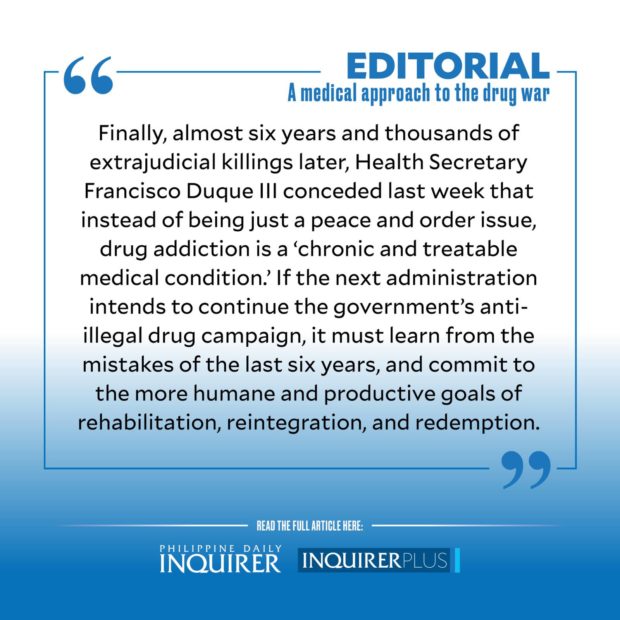A medical approach to the drug war

In the same launch of the Philippine National Police’s “end-game strategy” to the drug problem, PNP chief Gen. Dionardo Carlos spoke of continuing the government’s anti-narcotics operations by also undertaking the “rehabilitation, recovery, wellness, and reintegration of the more than 1.2 million (drug suspects who have) surrendered.”
The policy shift is a welcome move, and worlds away from the 2016 campaign promise of President Duterte, who vowed to rid the country of drugs in “three to six months” using whatever means necessary. Drug users, Mr. Duterte has said countless times, are beyond redemption and he’d be “happy to slaughter them.”
Article continues after this advertisementAdmittedly, the PNP statement, coming as it does in the heat of the campaign for the May 9 elections, may be suspect. Could it be an attempt to soften the government’s much-criticized war on drugs to help the Duterte daughter’s vice presidential bid? Maybe it’s meant to show that the country’s justice system is working and, therefore, the International Criminal Court, which has approved a full-blown investigation into charges of “crimes against humanity” against Mr. Duterte, should back off? Or could it be an attempt to finally use mega rehab facilities, to at least counter the bad taste left by the government’s profligate use of pandemic funds in the Pharmally mess?
The motive behind the PNP’s policy change may be subject to speculation, but not the results of this administration’s brutal antidrug campaign. According to the Philippine Drug Enforcement Agency, the death toll since the government’s drug war started in 2016 stood at 6,221 as of Nov. 30, 2021. Rights groups, however, contend that the real figure is at least thrice that, since many of the killings were classified as “deaths under investigation,” amid allegations that the police narrative of “shootouts” were actually rubouts.
That police abuses in connection with the drug scourge are still rampant is evident in the recent report of the Commission on Human Rights (CHR) in Bicol, which urged the National Police Commission regional office to file administrative and criminal cases against four police officers allegedly involved in the killing of three suspected drug traders in a buy-bust operation in February 2019. The report said the Daraga police station was “noncooperative” in providing the CHR with official investigation reports, the ballistic examination report, and the receipt and inventory of evidence seized from the scene of the crime operatives. The police officers also reportedly failed to comply with the three-witness rule required during the inventory and time of the warrantless arrest, “which could be an opportunity for law enforcers to plant evidence against the suspects,” the CHR said, echoing what has become common observation in most drug raids.
Article continues after this advertisementDespite the high body count, claims of successfully stopping the drug menace are belied by a drug raid in Infanta, Quezon, last week that the National Bureau of Investigation (NBI) has described as the “biggest drug haul in Philippine history.” NBI Acting Director Eric Distor said its operatives recovered almost 1,600 plastic tea bags containing P11 billion worth of “shabu” (crystal meth).
Then there’s Mr. Duterte’s admission as far back as 2018 that he has failed to control the market for drugs in the country. “Drugs will not end at the end of my term. It might just be worsened,” he said, adding that “what used to be millions of transactions’ worth, [is] now [worth] billions.”
As Jeremy Douglas, the Southeast Asia and Pacific representative for the United Nations Office on Drugs and Crime in Bangkok, once noted in a media interview: “Heavy suppression efforts marked by extrajudicial killings and street arrests were not going to slow down demand.” He added: “There has to be a focus on prevention and public health, coupled with intelligent policing that takes on transnational crime.”
It’s a strategy that the PNP appears to have adopted in its latest policy shift, called Adore (Anti-Illegal Drugs Operations through Reinforcement and Education). While more realistic and grounded on medical facts, this new tack should not diminish efforts by law enforcement agencies to investigate and hold accountable those who have participated in the government’s bloody war on drugs. The justice department must continue its so far very limited review of cases (only 52 out of thousands), where drug suspects were killed by police for reportedly resisting arrest or shooting it out with operatives.
If the next administration intends to continue the government’s anti-illegal drug campaign, it must learn from the mistakes of the last six years, and commit to the more humane and productive goals of rehabilitation, reintegration, and redemption.















